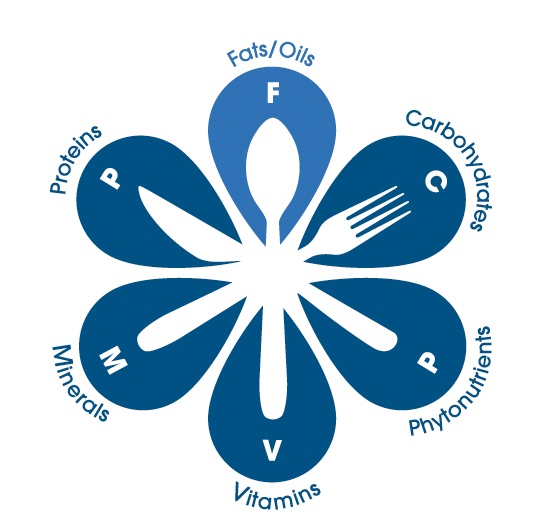Fats and Oils
Fats and oils provide a lot of energy (in the form of calories) in a relatively small amount of food. Once eaten, fat can be stored by the body for later use. When food is scarce, this stored fat becomes a source of fuel. Another one of the benefits of eating healthy fats is that it also provides necessary support for the brain, connective tissue, and digestive system. In short, fat plays an important role in health, and is an essential component of a balanced diet.
Different Types of Fat and Their Sources
The list below explains the various types of fats and foods that contain them. Keep in mind that all fat-containing foods contain a mix of different types of fats. In general, you should avoid trans fat and limit saturated fats in your diet. In contrast, unsaturated fats are generally considered healthy when their food sources are whole, natural foods.
Trans Fat
This type of fat is created by food manufacturers to transform a liquid to a solid in order to extend the shelf life of a food product. The FDA has largely banned artificial trans fat (in the form of partially hydrogenated oils) from the food supply because of its harmful effect on heart health.
Despite this ban, exceptions were made to allow artificial trans fat to remain in certain processed foods like coffee creamers, frozen desserts, fried foods, and microwave popcorn. Trans fat also naturally occurs in red meat and dairy products, though the health impact of natural trans fats less established than artificial trans fat. It is strongly recommended to avoid this type of fat entirely. To avoid trans fat, check the ingredient list of foods to make sure there are no “partially hydrogenated” oils included.

Macronutrients are a class of compounds that provide humans with energy and essential nutrients. They are required by the body in relatively large amounts on a daily basis and make up the bulk of the diet. Proteins, fats, and carbohydrates are the main types of macronutrients that provide the body with energy.
Saturated Fat
This type of fat is solid at room temperature. It is found in animal proteins (like beef, pork, and chicken) and dairy products. It is also found in some plant-based fats and oils, including coconut and coconut oil, palm oil, palm kernel oil, and hydrogenated oils. Coconut oil contains a unique type of healthy fat, called medium chain triglycerides, however it should be eaten in moderation like other sources of saturated fat.
When trans fats were banned by the FDA, many food manufacturers replaced trans fat with saturated fat (in the form of fully hydrogenated oils). In the U.S., saturated fat in the diet comes mostly from dairy products (such as cheese and ice cream), burgers, sandwiches, pizza, desserts, baked goods, and pasta. It is recommended to LIMIT this type of fat to no more than 7% to 10% of calories each day, and to opt for healthier unsaturated fats when possible.
Unsaturated Fat
These healthy fats are liquid at room temperature. They are heart-healthy and they can help reduce inflammation. They are mostly found in plant foods like vegetable oils, nuts, and seeds. There are several types of unsaturated fats:
Monounsaturated Fats
This type of unsaturated fat has one double bond in its chemical structure. These fats can improve blood cholesterol levels, and they also help keep the body’s cells healthy. Good sources of monounsaturated fats are avocados and avocado oil, olives and olive oil, almonds, hazelnuts, pecans, pumpkin seeds, and sesame seeds.
Polyunsaturated Fats
This type of unsaturated fat has more than one double bond in its chemical structure. Sources of polyunsaturated fats include fish, vegetable oils,and seeds:
Omega-3 fatty acids:
These polyunsaturated fatty acids are essential. This means that the body can’t make them, so we must get them from food. Omega-3s are important for brain health, development, and reducing inflammation, among other thing. Good sources of omega-3s are fatty fish (especially herring, oysters, salmon, and sardines) flaxseeds and flaxseed oil, chia, seeds, and walnuts.
Omega-6 fatty acids:
These polyunsaturated fatty acids are also essential, so we must get them from food. However, our diets are often too high in omega-6s from processed foods, which cause inflammation. Processed vegetable oils (like corn, sunflower, and soybean oil) are high in omega-6s, as are foods fried in or made with these oils (such as tortilla chips or baked goods). Omega-6s are also found in healthy foods like nuts and seeds (almonds, cashews, walnuts, and sunflower seeds.

Recommendations for Fat Intake
According to the Dietary Guidelines for Americans, adults should get 20% to 35% of their calories from fat. Infants and young children need a slightly higher proportion of fat (25% to 40%) for proper brain development. IFM (The Institute for Functional Medicine) recommends that fat should account for about 30% of daily calories for most healthy individuals. For those with specific health concerns requiring advanced therapeutic dietary interventions, fat recommendations may range from roughly 30% to 60% of daily calories, depending on the specific intervention or health condition. Talk to your functional medicine provider to learn what recommendation is best for you.
Tips for Incorporating Fats and Oils Into a Balanced Diet

- Top your salad with healthy oils (like extra virgin olive or walnut) instead of store-bought, shelf-stable salad dressings. Add a squeeze of lemon and balsamic vinegar for flavor.
- Incorporate fatty fish, like salmon, into your meals twice a week.
- Add freshly-ground flaxseeds or flaxseed oil to your morning smoothie or oatmeal.
- Have a handful of raw, unsalted nuts as a snack.
- Add avocado slices to sandwiches or salads. It can be a delicious, heart-healthy substitute for mayonnaise.



